Unit 4 Space Exploration Reading and Thinking 课件(共21张PPT,内镶嵌视频)-2025-2026学年人教版(2019)必修第三册
文档属性
| 名称 | Unit 4 Space Exploration Reading and Thinking 课件(共21张PPT,内镶嵌视频)-2025-2026学年人教版(2019)必修第三册 | 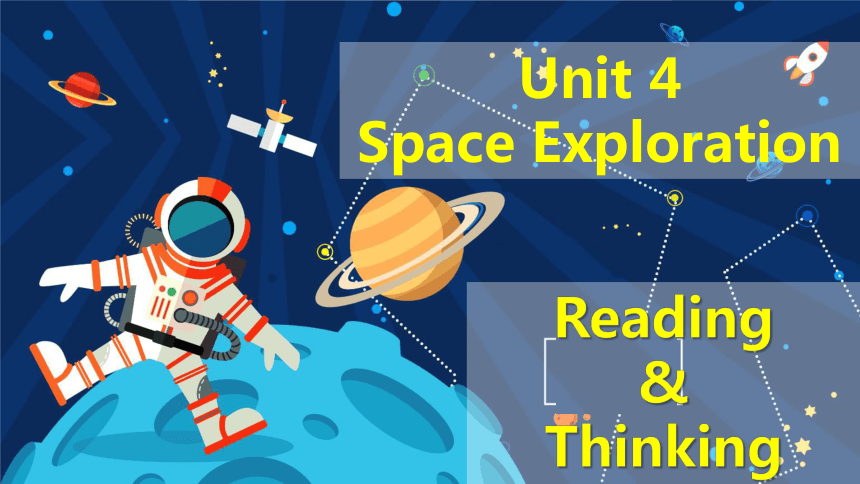 | |
| 格式 | pptx | ||
| 文件大小 | 26.5MB | ||
| 资源类型 | 教案 | ||
| 版本资源 | 人教版(2019) | ||
| 科目 | 英语 | ||
| 更新时间 | 2025-06-21 19:17:55 | ||
图片预览

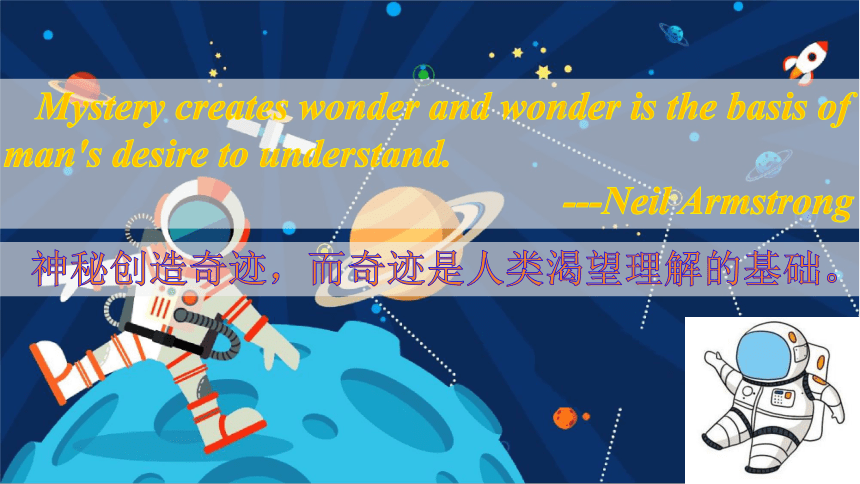
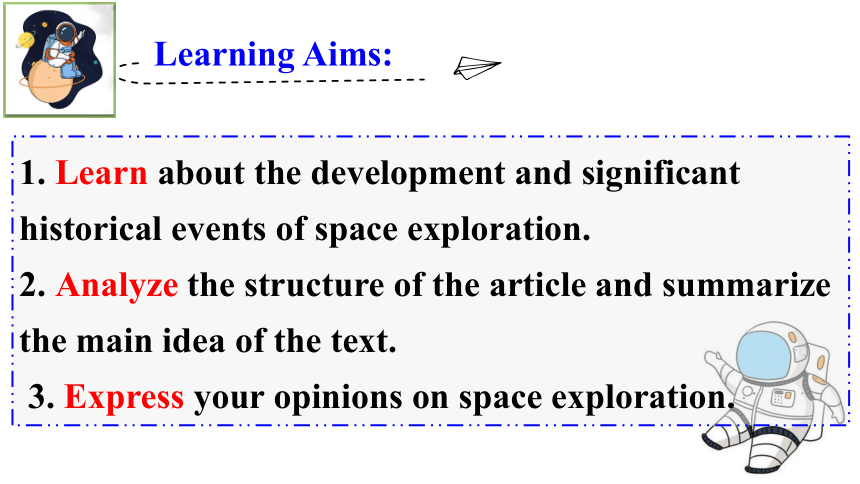
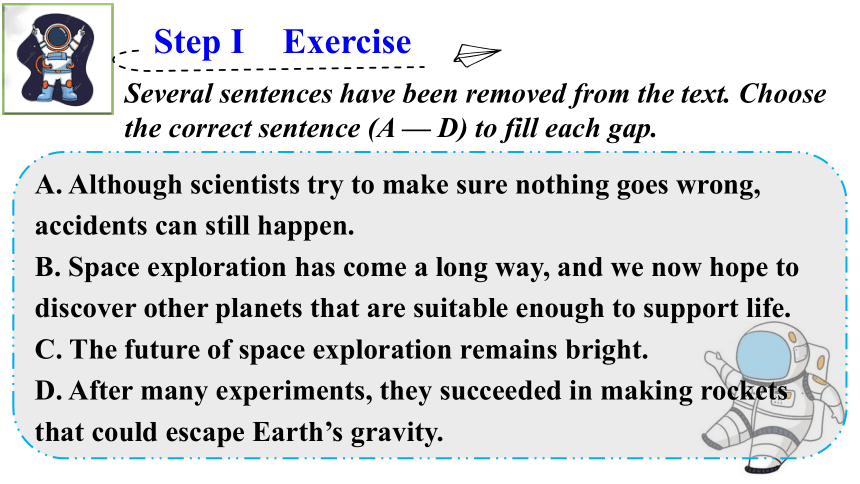
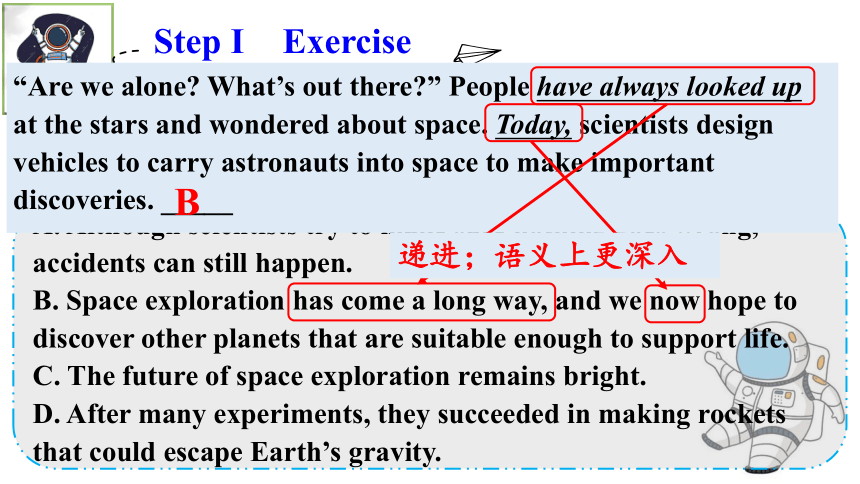
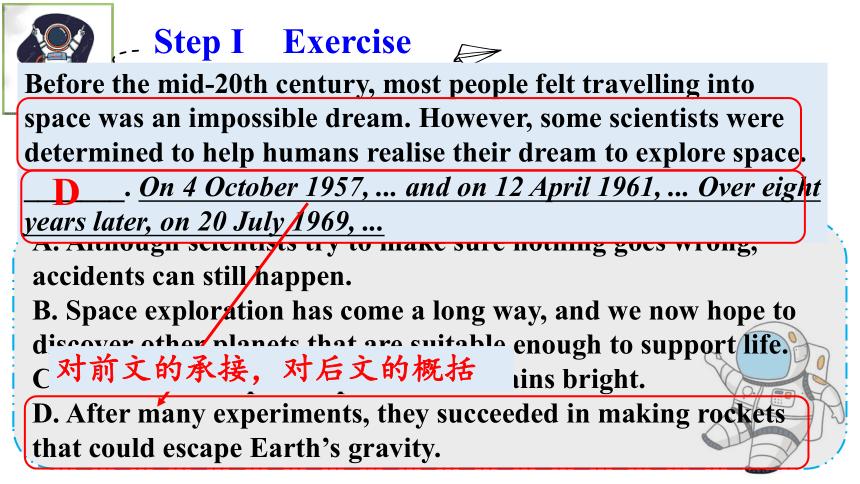
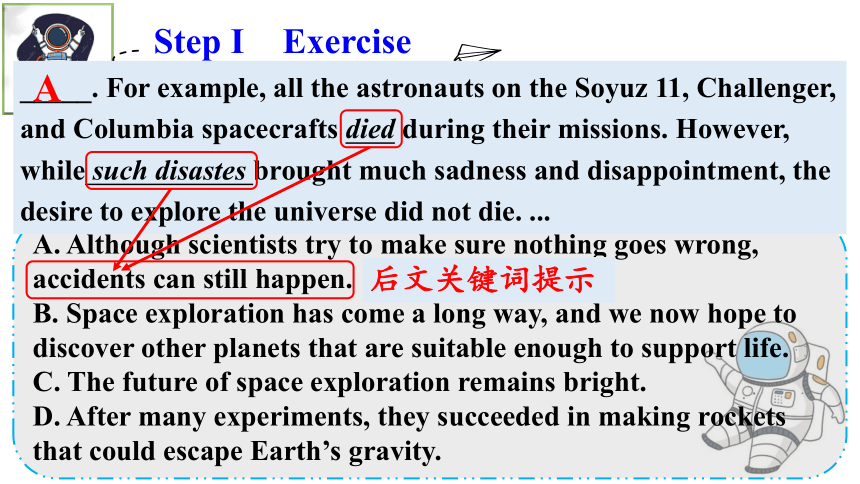
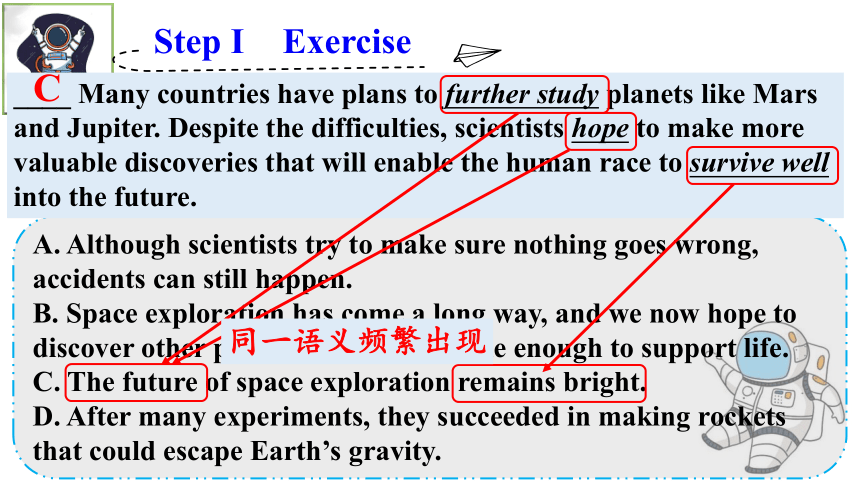
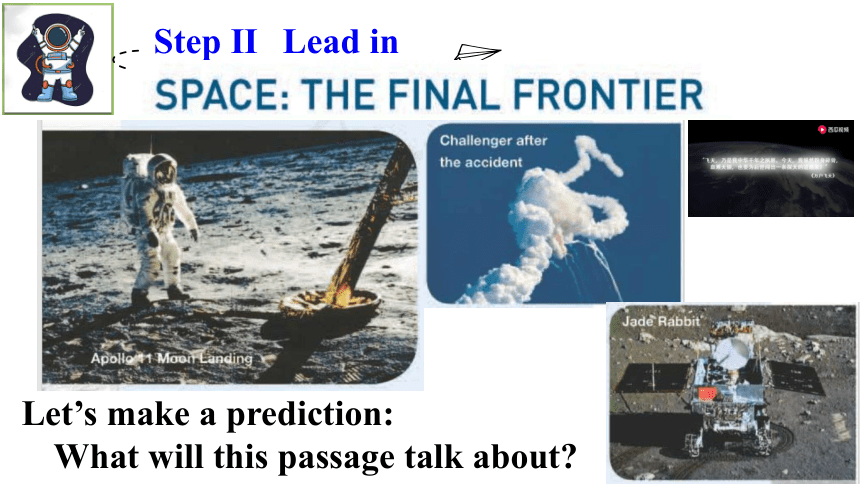
文档简介
(共21张PPT)
Unit 4
Space Exploration
Reading
&
Thinking
Mystery creates wonder and wonder is the basis of man's desire to understand.
---Neil Armstrong
神秘创造奇迹,而奇迹是人类渴望理解的基础。
Learning Aims:
1. Learn about the development and significant historical events of space exploration.
2. Analyze the structure of the article and summarize the main idea of the text.
3. Express your opinions on space exploration.
Step I Exercise
Several sentences have been removed from the text. Choose the correct sentence (A — D) to fill each gap.
A. Although scientists try to make sure nothing goes wrong, accidents can still happen.
B. Space exploration has come a long way, and we now hope to discover other planets that are suitable enough to support life.
C. The future of space exploration remains bright.
D. After many experiments, they succeeded in making rockets that could escape Earth’s gravity.
Step I Exercise
Several sentences have been removed from the text. Choose the correct sentence (A — D) to fill each gap.
A. Although scientists try to make sure nothing goes wrong, accidents can still happen.
B. Space exploration has come a long way, and we now hope to discover other planets that are suitable enough to support life.
C. The future of space exploration remains bright.
D. After many experiments, they succeeded in making rockets that could escape Earth’s gravity.
“Are we alone What’s out there ” People have always looked up at the stars and wondered about space. Today, scientists design vehicles to carry astronauts into space to make important discoveries. _____
递进;语义上更深入
B
Step I Exercise
Several sentences have been removed from the text. Choose the correct sentence (A — D) to fill each gap.
A. Although scientists try to make sure nothing goes wrong, accidents can still happen.
B. Space exploration has come a long way, and we now hope to discover other planets that are suitable enough to support life.
C. The future of space exploration remains bright.
D. After many experiments, they succeeded in making rockets that could escape Earth’s gravity.
Before the mid-20th century, most people felt travelling into space was an impossible dream. However, some scientists were determined to help humans realise their dream to explore space. _______. On 4 October 1957, ... and on 12 April 1961, ... Over eight years later, on 20 July 1969, ...
对前文的承接,对后文的概括
D
Step I Exercise
Several sentences have been removed from the text. Choose the correct sentence (A — D) to fill each gap.
A. Although scientists try to make sure nothing goes wrong, accidents can still happen.
B. Space exploration has come a long way, and we now hope to discover other planets that are suitable enough to support life.
C. The future of space exploration remains bright.
D. After many experiments, they succeeded in making rockets that could escape Earth’s gravity.
_____. For example, all the astronauts on the Soyuz 11, Challenger, and Columbia spacecrafts died during their missions. However, while such disastes brought much sadness and disappointment, the desire to explore the universe did not die. ...
后文关键词提示
A
Step I Exercise
Several sentences have been removed from the text. Choose the correct sentence (A — D) to fill each gap.
A. Although scientists try to make sure nothing goes wrong, accidents can still happen.
B. Space exploration has come a long way, and we now hope to discover other planets that are suitable enough to support life.
C. The future of space exploration remains bright.
D. After many experiments, they succeeded in making rockets that could escape Earth’s gravity.
____ Many countries have plans to further study planets like Mars and Jupiter. Despite the difficulties, scientists hope to make more valuable discoveries that will enable the human race to survive well into the future.
同一语义频繁出现
C
Step II Lead in
Let’s make a prediction:
What will this passage talk about
Step II Pre-reading
Read for the structure.
Main idea of each paragraph:
Para. 1: ________ have always had a natural curiosity about space.
Humans
Para. 2: Space travel became a reality in the _____ century, with American and Soviet space missions.
20th
Para. 3: ______________ has always involved great risk, but despite the risks ____________ continues.
Spave travel
exploration
Para. 4: _______ has made great progress in space exploration in the early 21st century, becoming the _____ country to independently send humans to space.
China
third
Para. 5: The ________ of space exploration looks bright, as many countries are planning further missions.
future
Q1: What’s the main idea of the text
The text is about the _____________ of space exploration.
development
Q2: What’s the structure of the text
Step III While reading
Read Para. 1 and answer the questions.
“Are we alone What’s out there ” People have always looked up at the stars and wondered about space. Today, scientists design vehicles to carry astronauts into space to make important discoveries. Space exploration has come a long way, and we now hope to discover other planets that are suitable enough to support life.
vehicles
Step III While reading
Read Para. 2 and answer the questions.
Before the mid-20th century, most people felt travelling into space was an impossible dream. However, some scientists were determined to help humans realise their dream to explore space. After many experiments, they succeeded in making rockets that could escape Earth’s gravity. On 4 October 1957, the Sputnik 1 satellite was lunched by the USSR and successfully orbited around Earth. Afterwards, the USSR focused on sending people into space, and on 12 April 1961, Yuri Gagarin became the first person in the world to go into space.
Q3: When did people make travelling into space possible
A. In the thirteenth century.
B. In the eighteenth century.
C. In the mid-20th century.
D. In the twenty-first century.
Step III While reading
Read Para. 2 and answer the questions.
Over eight years later, on 20 July 1969, American astronaut Neil Armstrong stepped onto the moon, famously saying, “That’s one small step for [a] man, one giant leap for mankind.” Following this, many more goals were achieved. For example, on 5 September 1977, America’s NASA space agency launched Voyager 1 to study deep space, and it still transmits data today. And the International Space Station(1998) has provided a continuous human presence in space, with astronauts from many different countries on board.
Q4: What was one giant leap for mankind
A. The Sputnik 1 satellite was launched and orbited around Earth.
B. Yuri Gagarin entered space on 12 April 1961.
C. America’s NASA space agency launched Voyager 1 on 5 September 1977.
D. American astronaut Neil Armstrong stepped onto the moon on 20 July 1969.
Q5: What does the word “this”in “Following this,there were many more important space achievements.” refer to
A. The launch of the Sputnik 1 satellite.
B. Yuri Gagarin’s entering space.
C. The study of deep space.
D. Neil Armstrong’s walk on the moon.
Step III While reading
Read Para. 2 and answer the questions.
the first person
the moon
Step III While reading
Read Para. 3 and answer the questions.
Although scientists try to make sure nothing goes wrong, accidents can still happen. For example, all the astronauts on the Soyuz 11, Challenger, and Columbia spacecrafts died during their missions. However, while such disastes brought much sadness and disappointment, the desire to explore the universe did not die. This is because people believe in the importance of carrying on space exploration despite the huge risks.
Q6: Why do people still want to explore the universe despite the disasters
A. Because they want to show how advanced science is.
B. Because they realize it is important to carry on space exploration.
C. Because they provide continuous human presence in space.
D. Because astronauts can work in the International Space Station.
Step III While reading
Read Para. 4 and answer the questions.
China’s space programme started later than those of Russia and the US, but it has made great progress in a short time. China became the third country in the world to independently send humans into space in 2003, when Yang Liwei successfully orbited Earth in the Shenzhou 5 spacecraft. Then Shenzhou 6 and 7 completed a second manned orbit and the first Chinese spacewalk, followed by the vehicle Jade Rabbit being sent to the moon to study its surface.
Step III While reading
Read Para. 4 and answer the questions.
On 23 July 2020, China sent Tianwen 1 to explore the surface of Mars. It arrived in February 2021 and then sent back lots of valuable information. And from 2021 to 2022, China completed a number of rocket missions to establish its own space station. In 2022, the launch of the Mengtian module signaled the basic completion of the Tiangong Space Station. This modern space station will allow astronauts to conduct many important experiments, greatly furthering our understanding of the universe.
Q7: What does the fourth paragraph mainly tell us A. China is the third country in the world to send humans into space.B. Yang Liwei successfully orbited Earth in the Shenzhou 5 spacecraft.C. China has made great progress in space exploration in recent years.D. The Tiangong Space will allow astronauts to conduct experiments.
orbited Earth
Shenzhou 6 and 7
Tianwhen 1
the Tiangong Space Station
Step III While reading
Read Para. 5 and answer the questions.
The future of space exploration remains bright. Many countries have plans to further study planets like Mars and Jupiter. Despite the difficulties, scientists hope to make more valuable discoveries that will enable the human race to survive well into the future.
Q8: What is the author’s attitude towards space exploration
A. Pessimistic.(悲观的) B. Disappointed.
C. Puzzled. D. Positive.
further study
Step IV Discussion
What does the title “Space: The Final Frontier” mean to you
Share your idea with the whole class.
How do you understand the passage above
Why is space considered as “The Final Frontier”
Step V Exercise
People have always looked up at the stars and wondered about space. Before the mid-20th century,1. (travel) into space was only a dream that could never come true. However, 2. the help of scientists, people succeeded in realising their dream 3. (explore) space. On 4 October 1957, the Sputnik 1 satellite 4. (launch) by the USSR. 5. scientists try to make sure nothing goes wrong, accidents can still happen. These disasters made everyone 6. (disappoint), but people still believe in the importance of 7. (carry) on space exploration. In 2003, China became the third country to
8. (independent) send humans into space. Then Shenzhou 6 and 7 completed 9. second manned orbit and the first Chinese spacewalk. In spite of the difficulties, scientists hope to make more valuable
10. (discovery) that will enable the human race to survive well into the future.
travelling
with
to explore
was launched
Although
disappointed
carrying
independently
a
discoveries
Thank you!
Unit 4
Space Exploration
Reading
&
Thinking
Mystery creates wonder and wonder is the basis of man's desire to understand.
---Neil Armstrong
神秘创造奇迹,而奇迹是人类渴望理解的基础。
Learning Aims:
1. Learn about the development and significant historical events of space exploration.
2. Analyze the structure of the article and summarize the main idea of the text.
3. Express your opinions on space exploration.
Step I Exercise
Several sentences have been removed from the text. Choose the correct sentence (A — D) to fill each gap.
A. Although scientists try to make sure nothing goes wrong, accidents can still happen.
B. Space exploration has come a long way, and we now hope to discover other planets that are suitable enough to support life.
C. The future of space exploration remains bright.
D. After many experiments, they succeeded in making rockets that could escape Earth’s gravity.
Step I Exercise
Several sentences have been removed from the text. Choose the correct sentence (A — D) to fill each gap.
A. Although scientists try to make sure nothing goes wrong, accidents can still happen.
B. Space exploration has come a long way, and we now hope to discover other planets that are suitable enough to support life.
C. The future of space exploration remains bright.
D. After many experiments, they succeeded in making rockets that could escape Earth’s gravity.
“Are we alone What’s out there ” People have always looked up at the stars and wondered about space. Today, scientists design vehicles to carry astronauts into space to make important discoveries. _____
递进;语义上更深入
B
Step I Exercise
Several sentences have been removed from the text. Choose the correct sentence (A — D) to fill each gap.
A. Although scientists try to make sure nothing goes wrong, accidents can still happen.
B. Space exploration has come a long way, and we now hope to discover other planets that are suitable enough to support life.
C. The future of space exploration remains bright.
D. After many experiments, they succeeded in making rockets that could escape Earth’s gravity.
Before the mid-20th century, most people felt travelling into space was an impossible dream. However, some scientists were determined to help humans realise their dream to explore space. _______. On 4 October 1957, ... and on 12 April 1961, ... Over eight years later, on 20 July 1969, ...
对前文的承接,对后文的概括
D
Step I Exercise
Several sentences have been removed from the text. Choose the correct sentence (A — D) to fill each gap.
A. Although scientists try to make sure nothing goes wrong, accidents can still happen.
B. Space exploration has come a long way, and we now hope to discover other planets that are suitable enough to support life.
C. The future of space exploration remains bright.
D. After many experiments, they succeeded in making rockets that could escape Earth’s gravity.
_____. For example, all the astronauts on the Soyuz 11, Challenger, and Columbia spacecrafts died during their missions. However, while such disastes brought much sadness and disappointment, the desire to explore the universe did not die. ...
后文关键词提示
A
Step I Exercise
Several sentences have been removed from the text. Choose the correct sentence (A — D) to fill each gap.
A. Although scientists try to make sure nothing goes wrong, accidents can still happen.
B. Space exploration has come a long way, and we now hope to discover other planets that are suitable enough to support life.
C. The future of space exploration remains bright.
D. After many experiments, they succeeded in making rockets that could escape Earth’s gravity.
____ Many countries have plans to further study planets like Mars and Jupiter. Despite the difficulties, scientists hope to make more valuable discoveries that will enable the human race to survive well into the future.
同一语义频繁出现
C
Step II Lead in
Let’s make a prediction:
What will this passage talk about
Step II Pre-reading
Read for the structure.
Main idea of each paragraph:
Para. 1: ________ have always had a natural curiosity about space.
Humans
Para. 2: Space travel became a reality in the _____ century, with American and Soviet space missions.
20th
Para. 3: ______________ has always involved great risk, but despite the risks ____________ continues.
Spave travel
exploration
Para. 4: _______ has made great progress in space exploration in the early 21st century, becoming the _____ country to independently send humans to space.
China
third
Para. 5: The ________ of space exploration looks bright, as many countries are planning further missions.
future
Q1: What’s the main idea of the text
The text is about the _____________ of space exploration.
development
Q2: What’s the structure of the text
Step III While reading
Read Para. 1 and answer the questions.
“Are we alone What’s out there ” People have always looked up at the stars and wondered about space. Today, scientists design vehicles to carry astronauts into space to make important discoveries. Space exploration has come a long way, and we now hope to discover other planets that are suitable enough to support life.
vehicles
Step III While reading
Read Para. 2 and answer the questions.
Before the mid-20th century, most people felt travelling into space was an impossible dream. However, some scientists were determined to help humans realise their dream to explore space. After many experiments, they succeeded in making rockets that could escape Earth’s gravity. On 4 October 1957, the Sputnik 1 satellite was lunched by the USSR and successfully orbited around Earth. Afterwards, the USSR focused on sending people into space, and on 12 April 1961, Yuri Gagarin became the first person in the world to go into space.
Q3: When did people make travelling into space possible
A. In the thirteenth century.
B. In the eighteenth century.
C. In the mid-20th century.
D. In the twenty-first century.
Step III While reading
Read Para. 2 and answer the questions.
Over eight years later, on 20 July 1969, American astronaut Neil Armstrong stepped onto the moon, famously saying, “That’s one small step for [a] man, one giant leap for mankind.” Following this, many more goals were achieved. For example, on 5 September 1977, America’s NASA space agency launched Voyager 1 to study deep space, and it still transmits data today. And the International Space Station(1998) has provided a continuous human presence in space, with astronauts from many different countries on board.
Q4: What was one giant leap for mankind
A. The Sputnik 1 satellite was launched and orbited around Earth.
B. Yuri Gagarin entered space on 12 April 1961.
C. America’s NASA space agency launched Voyager 1 on 5 September 1977.
D. American astronaut Neil Armstrong stepped onto the moon on 20 July 1969.
Q5: What does the word “this”in “Following this,there were many more important space achievements.” refer to
A. The launch of the Sputnik 1 satellite.
B. Yuri Gagarin’s entering space.
C. The study of deep space.
D. Neil Armstrong’s walk on the moon.
Step III While reading
Read Para. 2 and answer the questions.
the first person
the moon
Step III While reading
Read Para. 3 and answer the questions.
Although scientists try to make sure nothing goes wrong, accidents can still happen. For example, all the astronauts on the Soyuz 11, Challenger, and Columbia spacecrafts died during their missions. However, while such disastes brought much sadness and disappointment, the desire to explore the universe did not die. This is because people believe in the importance of carrying on space exploration despite the huge risks.
Q6: Why do people still want to explore the universe despite the disasters
A. Because they want to show how advanced science is.
B. Because they realize it is important to carry on space exploration.
C. Because they provide continuous human presence in space.
D. Because astronauts can work in the International Space Station.
Step III While reading
Read Para. 4 and answer the questions.
China’s space programme started later than those of Russia and the US, but it has made great progress in a short time. China became the third country in the world to independently send humans into space in 2003, when Yang Liwei successfully orbited Earth in the Shenzhou 5 spacecraft. Then Shenzhou 6 and 7 completed a second manned orbit and the first Chinese spacewalk, followed by the vehicle Jade Rabbit being sent to the moon to study its surface.
Step III While reading
Read Para. 4 and answer the questions.
On 23 July 2020, China sent Tianwen 1 to explore the surface of Mars. It arrived in February 2021 and then sent back lots of valuable information. And from 2021 to 2022, China completed a number of rocket missions to establish its own space station. In 2022, the launch of the Mengtian module signaled the basic completion of the Tiangong Space Station. This modern space station will allow astronauts to conduct many important experiments, greatly furthering our understanding of the universe.
Q7: What does the fourth paragraph mainly tell us A. China is the third country in the world to send humans into space.B. Yang Liwei successfully orbited Earth in the Shenzhou 5 spacecraft.C. China has made great progress in space exploration in recent years.D. The Tiangong Space will allow astronauts to conduct experiments.
orbited Earth
Shenzhou 6 and 7
Tianwhen 1
the Tiangong Space Station
Step III While reading
Read Para. 5 and answer the questions.
The future of space exploration remains bright. Many countries have plans to further study planets like Mars and Jupiter. Despite the difficulties, scientists hope to make more valuable discoveries that will enable the human race to survive well into the future.
Q8: What is the author’s attitude towards space exploration
A. Pessimistic.(悲观的) B. Disappointed.
C. Puzzled. D. Positive.
further study
Step IV Discussion
What does the title “Space: The Final Frontier” mean to you
Share your idea with the whole class.
How do you understand the passage above
Why is space considered as “The Final Frontier”
Step V Exercise
People have always looked up at the stars and wondered about space. Before the mid-20th century,1. (travel) into space was only a dream that could never come true. However, 2. the help of scientists, people succeeded in realising their dream 3. (explore) space. On 4 October 1957, the Sputnik 1 satellite 4. (launch) by the USSR. 5. scientists try to make sure nothing goes wrong, accidents can still happen. These disasters made everyone 6. (disappoint), but people still believe in the importance of 7. (carry) on space exploration. In 2003, China became the third country to
8. (independent) send humans into space. Then Shenzhou 6 and 7 completed 9. second manned orbit and the first Chinese spacewalk. In spite of the difficulties, scientists hope to make more valuable
10. (discovery) that will enable the human race to survive well into the future.
travelling
with
to explore
was launched
Although
disappointed
carrying
independently
a
discoveries
Thank you!
